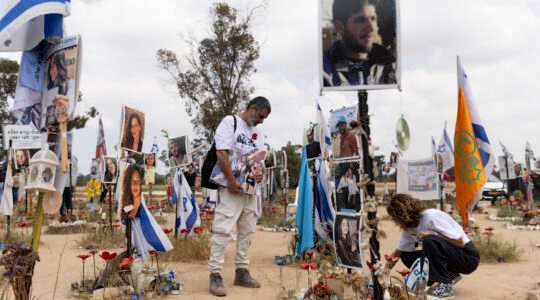YEHUD, Israel (JTA) — The young would-be convert to Judaism with a gold Star of David pendant peeking through a buttoned shirt is still baffled by the summer afternoon he says he was called in and dismissed from an Israeli army conversion course for being gay.
The 23-year old Y.B., as he asked to be identified, had not disclosed his sexual orientation to anyone in the course, but one of the rabbi instructors “outed him” to course administrators after presuming he was gay.
“I was in shock. I felt the color draining from my face,” Y.B. told JTA. “I left eyes full of tears and angry, asking myself, why are they doing this to me? I have a partner of six years who comes from a religiously observant home and we are there every Friday night for Shabbat. The family is accepting and loving. If they come from such a traditional place and accept us with love, why can’t others?”
During the tense dismissal meeting, Y.B. said he was told by two program officials that homosexuality is an aberration of Jewish law and that he would be welcome to return to the course if he committed himself to a heterosexual lifestyle.
The soldier’s experience highlights the plight that gay would-be converts to Judaism face in Israel: Because there is no separation of state and religion, and the state religion is regulated by the Orthodox-controlled Chief Rabbinate, it is practically impossible for an openly gay person to convert to Judaism. Under Orthodox Jewish law, a would-be convert who rejects a tenet of the Torah — in this case, the prohibition against homosexual intercourse — cannot join the faith.
The Israel Defense Forces’ conversion course, under the auspices of the army’s chief rabbi, has been considered to be a more open and tolerant vehicle for conversion than those overseen by the Chief Rabbinate.
A bill is pending in the Knesset that would make the army program officially independent from the Chief Rabbinate.
Uri Regev, former head of Israel’s Reform movement and president of Hiddush, an organization lobbying for freedom of religion in Israel, said Y.B.’s case is an example of why the bill doesn’t go far enough.
“Even the military conversion, which is considered in Israel to be a relatively liberal conversion avenue, stops short of openness and tolerance towards homosexuals,” Regev told JTA. “One must not accept a situation where the Israeli army, known for its progressive attitude towards homosexuals, will be a party to erecting a wall barring such soldiers from entering into the Jewish fold and declaring them to be unworthy of Jewish status.”
An IDF spokesman denied that Y.B. was expelled from the course because he is gay.
“The IDF believes that a person’s origin, gender and sexual orientation cannot have an impact on his or her ability to appropriately complete the conversion process,” the spokesman said in response to a JTA query. “The soldier in question chose to leave the course of his own accord because, as he noted, ‘He did not feel ready to complete the conversion process.’ The soldier was clearly informed he could return to the course when he felt ready to do so.”
Y.B. says that during his meeting with conversion course officials, he signed a form saying he was not ready to complete the process only because he was told he could not continue to study if he indeed was gay. The stipulation given for his return would be based on his agreeing to pursue relationships with women, Y.B. says he was told.
Y.B. says he grew up believing he was fully Jewish. So it came as a surprise when one of his officers approached him to see if he was interested in signing up for Nativ, the IDF conversion course through which some 4,000 soldiers have converted.
Y.B. immigrated with his family at the age of 2 from Buenos Aires, Argentina. His father is Jewish and his mother is not, but she kept a kosher home, lit candles for Shabbat and went with the family to synagogue. Y.B. had a bar mitzvah and observed the holidays.
When the officer approached him about the course, Y.B. said he responded, “What does this have to do with me?”
She told him he was not listed as being Jewish in his army paperwork.
“I remembered that my mother has mentioned not being Jewish, but it was not something I ever really thought about,” Y.B. said in an interview. “Everything I knew about our home was Jewish.”
But Y.B. decided he also wanted to be Jewish under the eyes of Jewish law and the State of Israel, so he signed up for the course when he was 19 while doing his mandatory military service. He decided not to continue to the second of two seminars but later regretted his decision.
Some three years later, when he was approached again to join a new conversion course for those in the reserves, Y.B. said he jumped at the chance.
By the time he started the course in July, Y.B.’s observance level had deepened. He was observing Shabbat and praying daily. He also was concerned about his father, then battling cancer. He said his father was heartened that his son was doing the conversion course.
“It had been very hard for my parents to accept me, and I thought I could never be hurt like that again,” Y.B. said. “But when this happened” — the conversion course dismissal — “I felt like it was happening all over again.”
His father died last fall, just a couple of months after Y.B. had to leave the conversion course.
“He took it very hard,” Y.B. said. “He said he was surprised by this discrimination within Judaism. He asked, why do people distance those who want to join our religion?”
During his three years of mandatory army service, Y.B. said he was always open about his sexual orientation and never encountered any problems because of it.
“The army was always such a supportive place, which is part of why I was so surprised when all of this happened,” he said. “I felt like I had gone backward in time back to when I was meant to feel like a mental case again.”
Looking down at his gold engagement ring — he has plans to marry his partner — Y.B. said he understood that homosexuality is condemned in the Torah. But he says he took the prohibitions in context, noting that the Torah also calls for adulterers to be stoned.
“I don’t think God hates me because I’m gay,” he said. “I believe he made me gay because that is the way he saw me. He makes us in his image.”
JTA has documented Jewish history in real-time for over a century. Keep our journalism strong by joining us in supporting independent, award-winning reporting.





